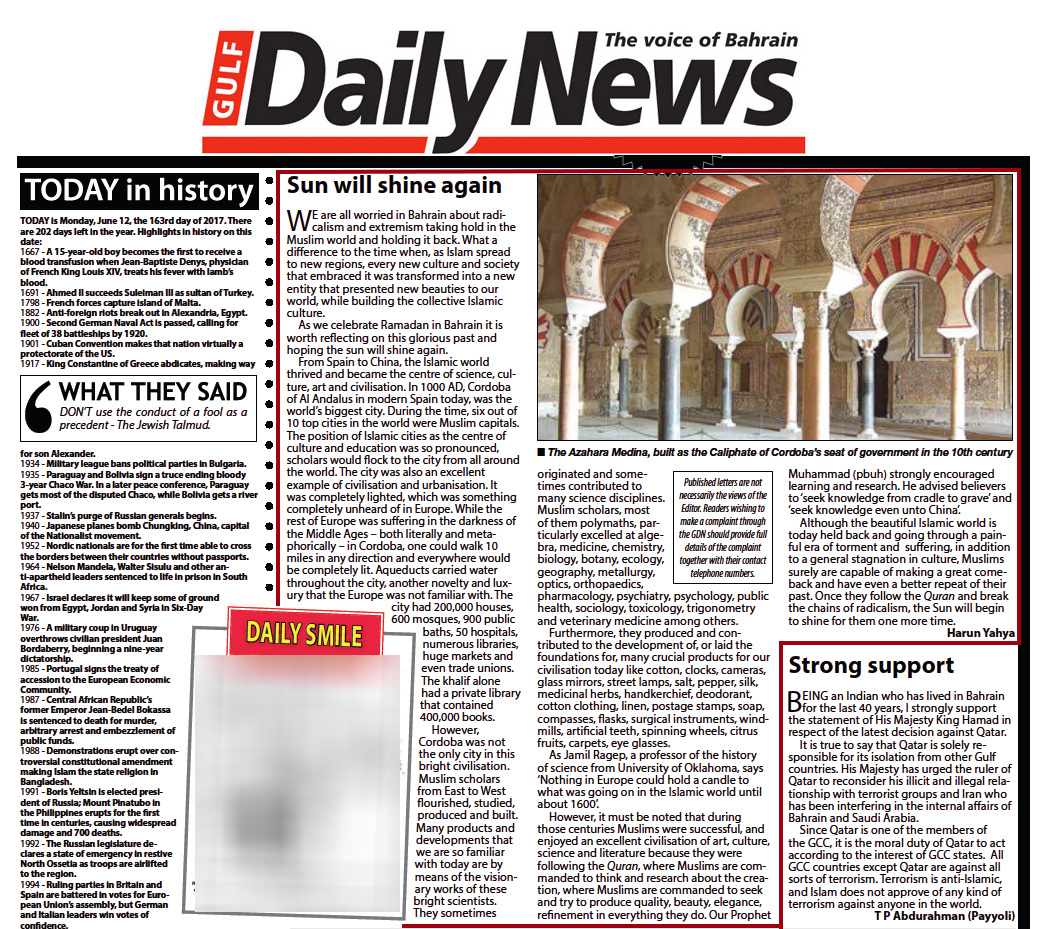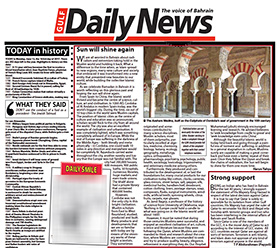
We are all worried in Bahrain about radicalism and extremism taking hold in the Muslim world and holding it back. What a difference to the time when, as Islam spread to new regions, every new culture and society that embraced it was transformed into a new entity that presented new beauties to our world, while building the collective Islamic culture.
As we celebrate Ramadan in Bahrain it is worth reflecting on this glorious past and hoping the sun will shine again.
From Spain to China, the Islamic world thrived and became the centre of science, culture, art and civilisation. In 1000 AD, Cordoba of Al Andalus in modern Spain today, was the world’s biggest city. During the time, six out of 10 top cities in the world were Muslim capitals. The position of Islamic cities as the centre of culture and education was so pronounced, scholars would flock to the city from all around the world. The city was also an excellent example of civilisation and urbanisation. It was completely lighted, which was something completely unheard of in Europe. While the rest of Europe was suffering in the darkness of the Middle Ages – both literally and metaphorically – in Cordoba, one could walk 10 miles in any direction and everywhere would be completely lit. Aqueducts carried water throughout the city, another novelty and luxury that the Europe was not familiar with. The city had 200,000 houses, 600 mosques, 900 public baths, 50 hospitals, numerous libraries, huge markets and even trade unions. The khalif alone had a private library that contained 400,000 books.
However, Cordoba was not the only city in this bright civilisation. Muslim scholars from East to West flourished, studied, produced and built. Many products and developments that we are so familiar with today are by means of the visionary works of these bright scientists. They sometimes originated and sometimes contributed to many science disciplines. Muslim scholars, most of them polymaths, particularly excelled at algebra, medicine, chemistry, biology, botany, ecology, geography, metallurgy, optics, orthopaedics, pharmacology, psychiatry, psychology, public health, sociology, toxicology, trigonometry and veterinary medicine among others.
Furthermore, they produced and contributed to the development of, or laid the foundations for, many crucial products for our civilisation today like cotton, clocks, cameras, glass mirrors, street lamps, salt, pepper, silk, medicinal herbs, handkerchief, deodorant, cotton clothing, linen, postage stamps, soap, compasses, flasks, surgical instruments, windmills, artificial teeth, spinning wheels, citrus fruits, carpets, eye glasses.
As Jamil Ragep, a professor of the history of science from University of Oklahoma, says ‘Nothing in Europe could hold a candle to what was going on in the Islamic world until about 1600’.
However, it must be noted that during those centuries Muslims were successful, and enjoyed an excellent civilisation of art, culture, science and literature because they were following the Quran, where Muslims are commanded to think and research about the creation, where Muslims are commanded to seek and try to produce quality, beauty, elegance, refinement in everything they do. Our Prophet Muhammad (pbuh) strongly encouraged learning and research. He advised believers to ‘seek knowledge from cradle to grave’ and ‘seek knowledge even unto China’.
Although the beautiful Islamic world is today held back and going through a painful era of torment and suffering, in addition to a general stagnation in culture, Muslims surely are capable of making a great comeback and have even a better repeat of their past. Once they follow the Quran and break the chains of radicalism, the Sun will begin to shine for them one more time.
Adnan Oktar's piece in Gulf Daily News:
http://www.gdnonline.com/Details/219598/GDN-Readers-View-Sun-will-shine-again


